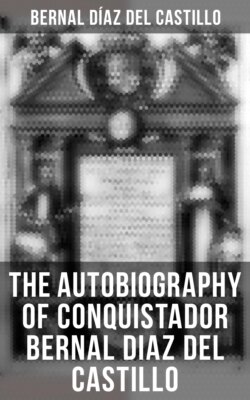Читать книгу The Autobiography of Conquistador Bernal Diaz del Castillo - Bernal Diaz del Castillo - Страница 29
На сайте Литреса книга снята с продажи.
CHAPTER XXII.
ОглавлениеTable of Contents
How the governor Diego Velasquez sends two of his officials in all haste to Trinidad, with full power and authority to deprive Cortes of his appointment of captain, and bring the squadron away, &c.
I must now carry my narrative back a few days, in order to relate what happened at Santiago de Cuba after our departure. We had scarcely set sail when Diego Velasquez's friends left him not a moment's peace, harassing him until they had totally revolutionised his sentiments with regard to Cortes. They now plainly told him that he might consider Cortes as lost to his interests from his having so secretly sneaked away from the harbour. Neither had he made any secret of his determination to have the chief command of the armament, whether Diego might wish it or not; for which reason he had embarked his men at night-time, that if any attempt were made to deprive him of the squadron, he would resist it by main force. He, the governor, had been deceived by his private secretary Duero, and De Lares the royal treasurer, who had both made some previous agreement with Cortes to procure him the command. But in particular the relatives of Velasquez were constantly urging him to cancel the recent appointment of Cortes, in which they were backed by a certain old man, named Juan Millan, commonly termed the astrologer, who was considered by many not to be exactly in his proper senses. This old man repeatedly told the governor that Cortes would now revenge himself for his having, some time ago, thrown him into prison: "Sly and artful as he is, he will be the means of ruining you, if you are not upon your guard."
These hints were not thrown away upon Velasquez; they brought about a revolution in his mind, which ended in his despatching two trustworthy persons out of his establishment, with private instructions to his brother-in-law Francisco de Verdugo, then alcalde major of Trinidad, by which he was peremptorily commanded, under all circumstances, to deprive Cortes of the squadron, whose appointment of captain had been withdrawn, and given to Vasco Porcallo. At the same time he wrote letters to Diego de Ordas, Francisco de Morla, and to his relations and friends, desiring them, at all events, to leave the squadron.
As soon as Cortes got information of this, he had a secret interview with Ordas and all those officers and inhabitants of Trinidad, who, he thought, might feel inclined to obey the orders of Velasquez. To these he spoke so feelingly, and in such kind terms, accompanied by such great promises, that they were all soon gained over to his side. Diego de Ordas even undertook to advise the alcalde major Francisco de Verdugo not to put these commands immediately into execution, and to keep them secret; telling him, at the same time, he had seen nothing in Cortes which gave the slightest reasons for suspecting him of anything wrong; on the contrary, he had, on every occasion, given proofs of his adherence to the governor. He assured him, moreover, that it would be an impossibility to deprive Cortes of the command of the squadron, in which he had so many friends among the cavaliers, and Diego Velasquez so many enemies, who would not easily forgive him that he had neglected to bestow on them more profitable commendaries. Besides the number of friends Cortes had among the officers, he could rely upon most of the soldiers, and thus it would be useless to attempt anything against him. The whole town would become mixed up in the quarrel, which would be plundered by our men, and even worse consequences might follow. By these arguments, Ordas prevented all violent measures; and one of the above-mentioned officials, whom Diego had sent with despatches to his nephew, named Pedro Laso, even joined our expedition. The other, Cortes sent back with a letter to the governor, in which he made use of every kind sentiment, and expressed his utter astonishment at the resolution he had taken, particularly as he had no other design than to serve God, his majesty the king, and the governor. He earnestly advised him not to listen any further to his cousin Velasquez, nor to allow the kind feeling he entertained for him to be poisoned by such an old fool as Juan Millan. Cortes, at the same time, wrote to his other friends, and in particular to his two confederates, the private secretary and royal treasurer.
The next step he took was to command his men to put their arms into good repair. Every smith in the town was set to work to fix points to our lances, and the gunners were ordered to search every magazine for arrows. He at last even persuaded the very smiths to join the armament.
We remained altogether twelve days at Trinidad, and thence sailed for the Havannah. From the foregoing statement, the reader will readily perceive how differently all this has been related by Gomara, who even makes Velasquez confer the chief command on Ordas; the latter, he says, invited Cortes to dine with him on board his vessel, had him seized while at dinner, and taken off prisoner to Santiago. I could cite many similar errors from Gomara's history, and thereby convince the reader that it is better to believe an eyewitness than an author who writes about things he never saw. However, enough of Gomara; let us return to our subject.
